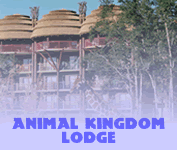
Animal Kingdom Lodge Animals
|
|
Giraffes, zebras and wildebeests have a colorful, diverse group of neighbors
on the African savannah of Disney's Animal Kingdom Lodge. They're joined
by a species of longhorn cattle so ancient it is depicted in Egyptian
pyramids, a turkey-sized bird that walks on its tiptoes, and a territorial
hoofed creature now extinct in its native habitat.
Altogether, more than 200 mammals and birds of nearly three dozen species
populate the 33-acre area planted to replicate an African savannah that
surrounds the deluxe lodge on three sides. Guests of Disney's Animal
Kingdom Lodge can view the creatures from their resort balconies or from
several viewing points -- including a landscaped rock outcropping --
the Arusha Rock kopje -- 24 hours a day.
At least 30 percent of the mammal species roaming the lodge savannah
cannot be seen at Disney's Animal Kingdom theme park, says lodge curator
Joe Kalla. A working wildlife reserve, the 74-acre Disney's Animal Kingdom
Lodge offers opportunities for guests to meet with African cultural representatives
and the animal care team. Those Disney cast members are equipped to offer
animal spotting tips, conservation information and background on the
animals.
"There's no place like this in the world, where you can have a room
with a savannah view and 24-hour viewing of animals from your balcony," says
Kalla, who once lived in Kenya and conducted animal research there. "This
really feels like an immersion into Africa."
Among the many species seen on the savannah:
- Ankole-Watusi Cattle An ancient breed once known as the Egyptian
Longhorn, it is a medium-sized member of the cattle family with very
long horns and a long tail pictured in 6,000-year-old Egyptian pyramids.
- Blesbok Now extinct in its native habitat, the blesbok is
a hoofed mammal with ridged lyre-shaped horns, found in a protected
area of South Africa. It has a short, glossy reddish or purplish coat
and a white blaze on its forehead divided by a dark bar between its
eyes.
- Abyssinian ground hornbill A large, turkey-sized bird with
black plumage and some white feathers, this hornbill rarely flies but
walks on its tiptoes. It's known for its deep, booming call -- especially
at dawn.
- Grant's zebra This zebra's broader stripes that extend around
its belly and down its legs distinguish it from other zebras. It communicates
with a variety of sounds (including barks), gestures and even facial
expressions.
- Thomson's gazelle Also referred to as Tommies, these herbivores
are known for their endurance that allows them to escape swift predators
such as cheetahs or lions. The small creatures have rich tan skin with
black racing stripes on their sides, and males have curved ringed horns.
- White-bearded wildebeest Known for traveling in large herds,
the wildebeest is a large, high-shouldered antelope with a broad muzzle,
an ox-like head and cow-like horns. It can go five days without water
and mainly eats grasses and succulent plants. At night, the wildebeest
will often sleep in rows, which offers the security of a group while
allowing each individual a quick getaway in case of danger.
- Sacred ibis A long-legged bird from south of the Sahara and
Madegascar, the sacred ibis has white feathers and black decorated
plumage toward its lower back. It builds nests in trees or tall grass
and forages along streams and lakes.
- Bongo Certain populations of this solitary forest dweller
have been designated endangered or near threatened. Bright or dark
chestnut red, both the male and female bongo have horns that spiral
into a complete twist. The bongo can also be seen throughout the evening,
browsing in the moonlight.
All animals inhabiting the savannah return periodically to an on-site
animal care facility for feeding and routine care. Many of the species
browse, as well, on savannah plantings that are part of their everyday
diet and are continually replenished by horticulturists.
Animals populating the savannah of Disney's Animal Kingdom Lodge either
originated at Disney's Animal Kingdom theme park or arrived from other
accredited zoological facilities, Kalla says. Nighttime viewing of the
animals "that just adds to the whole African experience" will occur with
the help of artificial lighting that mimics soft moonglow, he says. "We
hope people will leave with a greater appreciation for wildlife."
Disney's Animal Kingdom Lodge
Species List
Mammals:
Ankole cattle
Thomson's gazelle
Impala
Blesbok
Giraffe
Greater kudu
Waterbuck
Zebra
Bongo
Wildebeest
Eland
Birds:
African spoonbills
Common pintail
Vulturine guinea fowl
Helmeted guinea fowl
Greater flamingo
East African crown crane
Ostrich
Yellow-billed duck
White-faced tree duck
Sacred ibis
Common shelduck
Marabou storks
Blue cranes
Pink-backed pelicans
Abyssinian ground hornbills
Ruppell's griffon vultures


